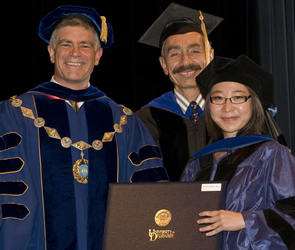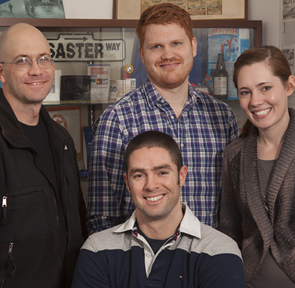Traditionally, professionals and scholars in economic education have been trained in either economics or education, with little or no formal training in the other area. The need for financial literacy is growing, and so is the demand for professionals and scholars who can educate the community and influence school curricula about core economic issues. With the goal of closing that gap, UD's Department of Economics and School of Education recently joined forces to launch a new and innovative doctoral program in economic education, drawing on the more than 40 years of expertise of UD's Center for Economic Education and Entrepreneurship. "Economic problems have become more complex and so have the educational issues," said Saul Hoffman, professor and chair of the Department of Economics in the Alfred Lerner College of Business and Economics. "Having professionals in the field of economic education who have both sets of skills is absolutely necessary. With this curriculum design, there's literally nothing like it anywhere in the country. It's the premier program in economic education." Doctoral candidate Erin Yetter will soon become the first graduate of the UD program, and has already begun her new position as an economic education specialist with the Federal Reserve Bank of St. Louis, Louisville Branch where she writes curriculum materials, conducts professional development for teachers and continues to research student learning of economic concepts. "I found the perfect career for my skill set and education," said Yetter. "I could not have found a better fit for what my training and education prepared me to do."
|
||||||||||||||||||||||||
 |
Ph.D./MBA graduate Weiping Wang, at the 2009 UD doctoral hooding ceremony, with her doctoral adviser Professor Daniel Simmons (center), and University of Delaware President Patrick Harker (at left). |
With increasing career opportunities for Ph.D.-level biology graduates in fields like biotechnology, industrial science, pharmaceuticals, and other life sciences industries, the Department of Biological Sciences and Alfred Lerner College of Business and Economics recently partnered to offer a dual degree program leading to the Ph.D. in biological sciences plus the MBA degree.
"Nearly half of life sciences graduate students intend to pursue careers in industry and government; thus, in our field, nonacademic career paths are the norm," said UD's Melinda Duncan, professor of biological sciences and graduate program chair. "The Ph.D./MBA is one of the department's many efforts to encourage doctoral students to explore and prepare for the wide range of careers open to those with advanced life sciences training."
One of the dual program's first graduates is Weiping Wang, whose first industry position after completing postdoctoral benchwork was director of business development for a biotech business incubator. Her responsibilities included daily operations, recruitment of potential entrepreneurs and projects and building collaboration with Chinese industrial parks.
Having the business administration background of the MBA to supplement her Ph.D. in biology was a huge plus, said Wang. "The dual degree gave me a great advantage in what I was doing. With my biology background, I could understand the project concepts, but I could also analyze the feasibility of those projects. With my MBA training, I could work together with the scientists and entrepreneurs to market their products and understand their financial conditions." Added Wang, "Being involved in the biotech field, I feel that I'm contributing to the technology advances that make people's lives healthier and better. That is very exciting."
 |
Doctoral students in UD's graduate program in disaster
science and management include (standing, from left)
James Goetschius, Alex Greer, Danielle Nagele and (seated)
Ryan Burke. [Photo: Ambre Alexander] |
UD's Disaster Research Center is widely recognized as one of the pioneering institutions in the social scientific study of disasters. Building upon its nearly 50 years of expertise in the field, the center's graduate program in disaster science and management accepted its first students in 2010. Faculty are drawn from civil and environmental engineering, nursing, marine science and policy, political science and international relations, public policy and administration and sociology and criminal justice.
Graduate students in the Ph.D. program represent a wide range of backgrounds and research interests, many having entered the program with extensive professional experience in the field.
Doctoral student James Goetschius has served for more than 16 years as a health facilities planner for the U.S. Army, and entered the program seeking additional expertise in engineering and public health topics. "A key feature of this program is its relationship with the Disaster Research Center, with resources that are unparalleled by any other school in the country," said Goetschius. "The interdisciplinary nature of the program allows us to increase our expertise across a wide range of disciplines—the social sciences, engineering, public policy. We have the opportunity to work with experts across the University, both inside and outside the core faculty."
Ryan Burke's academic background is in military science and homeland security, in addition to having served on active duty as an officer in the Marine Corps involved in disaster preparedness activities. "In pursuing a doctoral level program in this field, I gravitated toward logistics and operations, and decision-making frameworks," said Burke. "My background fit very well with this program."
"I think one of the unique aspects of this program is the opportunity to build your own curriculum," said Ph.D. candidate Danielle Nagele, whose background is in meteorology and emergency management. "I've combined civil engineering, sociology, public policy and other topics. Given our varying backgrounds and professional goals, it's very helpful to have the freedom to do that."
Doctoral student Alex Greer is studying individuals' recovery process following a disaster, inspired by resettlement patterns currently taking shape following Hurricane Sandy. "The interdisciplinary nature of this field is critical to approaching the multidimensional topics we consider. It widens our tool set and allows us to look at many more possible explanations. It also enables me to more easily step outside my discipline for collaboration. This field is always exciting and gives me the opportunity to make an impact on people with my work, which is really rewarding."
Article by Nora Riehl Zelluk

